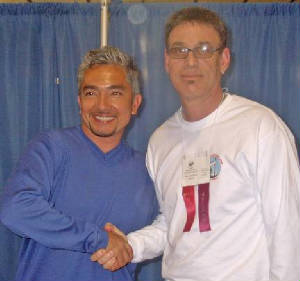At What Age Are Puppies Behind on Their Potty Training?
As exciting as it can be to invite new puppies into your home, it is a process getting them to fully fit with your family. Potty training is perhaps the most pivotal part of making sure that your pet adapts to its new environment.
It's a process that requires patience, consistency, and an understanding of your puppy's development. But when do you know if your puppy is behind on their potty training? Can puppies be behind?
Aggressive Dog Training Online for All Dog Breeds with Marc Goldberg
Sometimes, we through the word “aggressive” around too often when we talk about dogs. Dogs do not want to be aggressive. But trauma, fear, training, loneliness, and certain instincts can cause dogs to appear or act in aggressive ways.
In situations when a dog is acting aggressive towards family members, other dogs, or strangers, getting help not only keeps you safer – it often makes the dog happier as well. If you’re in need of aggressive dog training online or in person, please contact Marc Goldberg today, published co-author of several dog training books and a specialist in aggressive dog behaviors.
Virtual Dog Training Benefits with Marc Goldberg
Marc Goldberg, co-author of multiple dog training books available in major retailers nationwide, is thrilled to be able to offer virtual dog training as part of his growing list of services. This type of training, which takes place entirely via video (Zoom, Skype, Facebook Messenger, or whatever is easier for you), allows anyone that wants to train with Marc to receive that training without needing to come in to his Chicago area dog training center.
But why would someone want to receive dog training online? Why would virtual dog training be a better alternative than in-person training, especially since dogs are not going to be learning through Zoom?
Online Dog Training from Marc Goldberg, Author and Dog Trainer
Receive Dog Training Online and Address Dog Behavior with Remote Dog Training Via Video/Phone
Marc Goldberg is the co-author of several top selling dog training books, along with the Monks of New Skete. He offers dog training in the Chicago area, but – through the power of video technology – he is now able to offer online dog training for dog owners ready for individualized, personalized attention that speaks to the needs of their pet.
Does Pet Insurance Help?
As responsible pet owners, we often face the challenge of ensuring our pets' health and well-being while acknowledging that the costs for this type of care can be fairly substantial. This can lead to situations where, depending on our financial situation, we may be forced to decide whether we can even afford to care for our pets.
Pet insurance is designed to be the solution for this. But in the early days of the pet insurance industry, there were a lot of news stories about pet insurance agencies that were not coming through, or were not covering enough. So, does pet insurance help?
Understanding the Costs and Benefits of Pet Insurance
The concept of pet insurance is appealing, offering a financial cushion for unexpected veterinary expenses. However, skepticism about pet insurance is common, fueled by stories of insufficient coverage or denied claims from less reputable providers. Yet, many trustworthy pet insurance companies exist, providing crucial financial support for pet care.
Lauren S., who operates a Texas-based independent insurance agency offering insurance services, shares her perspective: "Selecting a reliable pet insurance brand is key to getting coverage for significant vet bills. I began providing pet insurance only after experiencing its benefits firsthand with my pet during an emergency. It was invaluable, but it is still crucial to research and identify trustworthy providers."
Why is it So Important Not to Punish a Dog When it Growls?
Dogs cannot communicate like humans. It’s why it’s so important for us to learn how to let dogs be dogs. One way that we can do this is to learn when, and why, we should not punish growling. There’s a tendency for dog owners to punish a dog when it growls, and that can be a problem – one with potentially harmful, and in some cases deadly consequences.
Dog Training is About Training You
Marc Goldberg is an internationally known dog trainer. He, and the rest of the team here at Chicago Dog Trainer, are contacted regularly by people that have read his books to provide both in person and digital video dog training to those that need the extra help.
One thing that we notice, however, is that there is a misconception about who dog training is for. When people call us, they often ask us if “we” can train their pet. But dog training isn’t about us. It’s about you.
In Person Dog Training and Why a Bit of a Drive Can Help Train Your Dog for Life
Here at Chicago Dog Trainer, Marc and his team have become fairly well known through his books throughout the United States. We are often contacted by people for online dog training through Zoom and other means to provide training on the phone, computer, or anywhere with digital access.
However, we also continue to operate the Little Dog Farm near Chicago, and we still very much encourage people to come visit us in person if they’re anywhere in the Chicago area, even if they’re a bit farther from our office in Elgin, Il.
Training Your Dog According to Their Breed Specific Traits: German Shepherd
It is important when we train dogs not to just pick tricks that we think will be fun to show off or practice. While these have their place, every breed of dog has a unique disposition and personality. This means that training your dog using techniques or tricks that are fun for them can be far more beneficial in the long run.
One of our winning strategies at Chicago Dog Trainer is to allow your dog to be who they are, and this means letting them be the breed of dog that they are. Many breeds have behaviors or drives that make them fantastic at one form of training or another. Some dogs are herders, others love to dig, and some just want to run and retrieve. Understanding our different dog breeds and their tendencies is an essential part of promoting the best behavior for the dog possible. This in turn will allow your dog to be the most happy and comfortable possible.
Important Tips for a New Dog Walker
Embarking on the journey of dog walking can be a bit daunting at first. The degree of control and vigilance it demands, especially if you're unfamiliar with canine behavior, can seem overwhelming. However, the world of dogs is rich with insights and practices that can equip you to become a proficient walker in no time. Master the basics, understand your dog's cues, and soon enough, these walks will transform into serene bonding moments.
The Safest Way for a Dog and Cat to Meet
It can be a stressful time introducing a cat to a home that already has a dog, or introducing a dog to a home that already has a cat. While many dogs and cats can learn to live peacefully together, it takes patience and a careful meeting process to build that relationship.
Theories of Discipline - How to Discipline a Dog Without Harming Future Behaviors
Disciplining a dog is an essential aspect of their training journey, but it requires a delicate balance of assertiveness and compassion. As responsible dog owners, we must strive to discipline our furry companions in a way that fosters a positive and respectful relationship, laying the groundwork for well-rounded behaviors in the future.
Dogs do not understand discipline the way humans do, and so the way that we – as dog owners – need to think about discipline (how, when, and why) will need to change in order for us to do it effectively. The following are some tips and information on discipline that all dog owners will need to consider.
Our Philosophy & Goals
Our philosophy is simple. Improve the life of both dog and family. All too often, unruly dogs do not fully enjoy life because their families constantly become upset and frustrated with them. This is difficult for both family and dog.
Our mission is simple. Make both dog and family happy.
What does is take to make your dog happy? He will thrive when you give him leadership and attention.

Making the family happy is a bit more complex.
Families typically want their dog to:
- Come when called, every time, on or off leash
- Walk nicely on a loose leash without pulling
- Sit until released
- Down until released
Families also want their dogs:
- Not to jump on people
- Not to charge through doors
- Not to dig in the garden
- Not to bark and chew inappropriately
- Not to climb on furniture you prefer they avoid
- Not to sniff and eat off the table and counters.
- Not to be wild and uncontrollable
- Not to ignore you when you want their attention




